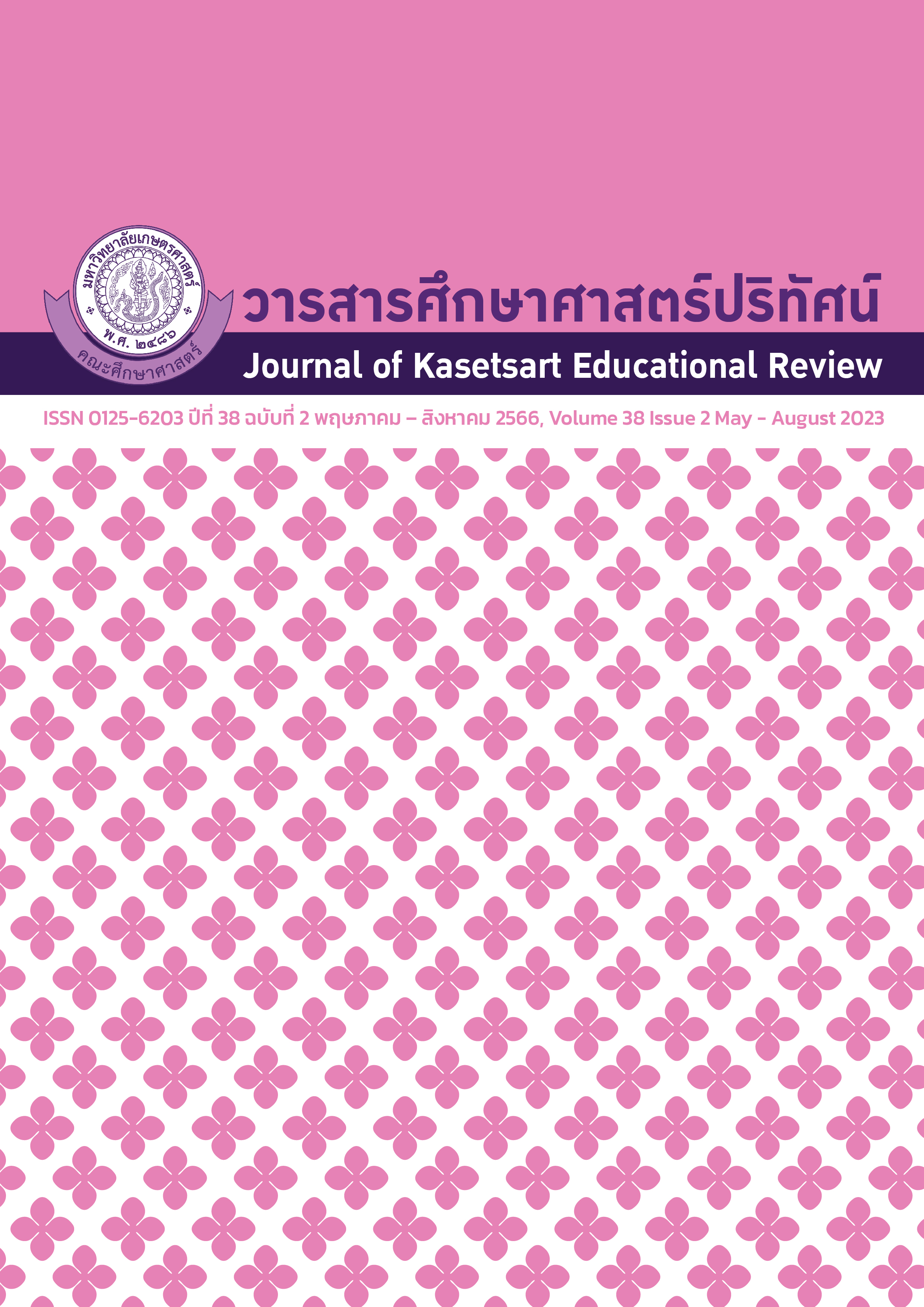การพัฒนาความสามารถในการแก้ปัญหาทางวิทยาศาสตร์ของนักเรียนชั้นมัธยมศึกษา ปีที่ 2 ด้วยการจัดการเรียนรู้โดยใช้ปัญหาเป็นฐานแบบออนไลน์
คำสำคัญ:
การจัดการเรียนรู้โดยใช้ปัญหาเป็นฐาน, ความสามารถในการแก้ปัญหาทางวิทยาศาสตร์, นักเรียนระดับมัธยมศึกษาปีที่ 2, การเรียนรู้แบบออนไลน์บทคัดย่อ
งานวิจัยนี้ มีความมุ่งหมาย 1) เพื่อศึกษาความสามารถในการแก้ปัญหาทางวิทยาศาสตร์ของนักเรียนชั้นมัธยมศึกษาปีที 2 ที่เรียนด้วยการจัดการเรียนรู้โดยใช้ปัญหาเป็นฐานแบบออนไลน์ เรื่อง โลกและทรัพยากรธรรมชาติ และ 2) เพื่อเปรียบเทียบคะแนนเฉลี่ยความสามารถในการแก้ปัญหาทางวิทยาศาสตร์ ก่อนและหลังได้รับการจัดการเรียนรู้โดยใช้ปัญหาเป็นฐานแบบออนไลน์ ของนักเรียนระดับชั้นมัธยมศึกษาปีที่ 2 ของโรงเรียนแห่งหนึ่งในจังหวัดสมุทรปราการ จำนวน 30 คน ได้จากการเลือกแบบเจาะจง เครื่องมือที่ใช้ในงานวิจัยประกอบด้วย แผนการเรียนรู้ แบบวัดความสามารถในการแก้ปัญหาทางวิทยาศาสตร์ ทำการวิเคราะห์ข้อมูลด้วยสถิติบรรยาย ได้แก่ ร้อยละ ค่าเฉลี่ย และส่วนเบี่ยงเบนมาตรฐาน ผลการวิจัยพบว่า 1) นักเรียนมีคะแนนเฉลี่ยความสามารถในการแก้ปัญหาทางวิทยาศาสตร์หลังเรียนเท่ากับ 15.06 คะแนน (SD = 3.01) โดยมีค่าเฉลี่ยด้านการระบุปัญหามากที่สุด (M = 4.03, SD =0.81) ตามด้วย การวิเคราะห์สาเหตุของปัญหา (M = 3.83, SD = 0.59) การตรวจสอบวิธีการแก้ปัญหา (M = 3.70, SD = 0.75) และการเสนอวิธีการแก้ปัญหาและตั้งสมมติฐาน (M 3.50, SD = 0.86) ตามลำดับ 2) นักเรียนมีคะแนนเฉลี่ยความสามารถในการแก้ปัญหาทางวิทยาศาสตร์หลังเรียน (M 15.06 =, SD =3.01) สูงกว่าก่อนเรียน (M =11.10, SD =4.65) อย่างมีนัยสำคัญที่ระดับ .05 (t =6.318, p = .000) และอยู่ในระดับดี
เอกสารอ้างอิง
Aslan, A. (2021). Problem-based learning in live online classes: learning achievement, problem-solving skill, communication skill, and interaction. Computers & Education, 171. https://doi.org/10.1016/j.compedu.2021.104237
Chuaytukpuan, T. (2017). A study of problem solving process deficiencies in physics by Heller and Heller’s logical problem solving strategy of undergraduate students : a case study of undergraduate students at Dhurakij Pundit university. Journal of Educational Research, 11(1), 26-35. [In Thai]
Jeenapak, K. (2021). The Effectiveness of Online Learning. Global goals, local actions: looking back and moving forward 2021", 14(2), 10-20. [In Thai]
Khammaneejan, U. (2009). Comparison’ of learning achievement, problem solving in science and attitudes toward science learning of matthayomsuksa 3 students who learned using problem – based learning approach and 5e learning cycle [Unpublished master’s thesis]. Mahasarakham University. [In Thai]
Manwa L. (2014). Designing, implementing and evaluating an online problem-based learning (pbl) environment – a pilot study. Clinical Linguistics & Phonetics, 28(1), 98-111.
Monsang, P. (2021). The effects of problem based learning for enhancing science problem solving skills. Journal of Physics: Conference Series, 1853, 1-8. https://doi.org/ 10.1088/1742-6596/1835/1/012016
Muangjin, C. (2018). A study of academic achievement in science and problem solving ability of student in junior high school of Ramkamhaeng university demonstration school by metacognitive method. Journal of Educational Research, 13(1), 57-58. [In Thai]
Mustafa, F., & Tuncel, M. (2019). Integrating augmented reality into problem based learning: the effects on learning achievement and attitude in physics education. Computers & Education, 142, 1-30.
Naochang, N. (2020). The effects of problem-based learning activities in physics course on scientific problem solving and critical thinking ability of matthayomsuksa VI students at Mueang Khong school in Nakhon Ratchasima province. KKU research Journal of Humanities and Social Sciences (Graduate studies), 8(1), 41-51. [In Thai]
Nueangchomphu, J. (2021). The effects of a project-based learning entitled “motion” on improving integrated science process skills and problem-solving ability for the second year vocational certificate students. Journal of Education and Innovative Learning, 1(2), 171- 186. [In Thai]
Office of the Education Council. (2017). The twelfth national economic and social development plan (2017-2021). (n.p.). [In Thai]
Partnership for 21st Century Skills. (2009). Framework for 21st century learning. https://www.p21.org/index.php? option=com_ content&task=view&id=254&Itemid =120
Pizzini, E. L., Shepardson, D. P., & Abell, S. K. (1989). A rationale for and the development of a problem solving model of instruction in science education. Science Education, 73(5), 523-534.
Podapol, C. (2020). Online learning management: new normal of education. Mahamakut Buddhist University. https://slc.mbu.ac.th/article/28181/[In Thai]
Pongphoka, S. (2015). The development of problem-solving thinking ability of mutthayomsuksa 6Students by future problem solving technique and mind mapping. Veridian E –Journal, Silpakorn University, 8(2), 1223 -1237. [In Thai]
Pumchumpol, N. (2012). The development of problem solving abilyty and learning achievement entitle “plants around us” for grade 4 students by inquiry cycle. Journal of Education Graduate Studies Research. 6(1), 46-53. [In Thai]
Sternberg, R. J., & Ben-Zeev, T. (2001). Complex cognition : the psychology of human thought. Oxford University Press.
Suwannapha, O. (2011). Matayomsuksa 1 students’ problem solving by using knowledge management based on Guilford’s approach in substance characteristic and classification. Journal of Education Graduate Studies Research, 5(4), 130-138. [In Thai]
Thaengnoi, P. (2017). Study of scientific problem-solving abilities based on scientific knowledge about atmosphere and weather for seventh grade students. Journal of Education, Mmahasarakham University. 11(2), 143-154. [In Thai]
Thailand development research institute(TRDI). (2020). What is the new normal of Thai education? When distance learning is not the answer. https://tdri.or.th/2020/05/desirable-new-normal-for-thailand-education/ [In Thai]
The Institute for the Promotion of Teaching Science and Technology (IPST). (2017). 21st Century skills of students. IPST magazine, 45(208), 31-33. [In Thai]
Weir, J. J. (1974). Problem solving is everybody’s problem. Science Teacher, 41, 16-18.
ดาวน์โหลด
เผยแพร่แล้ว
ฉบับ
ประเภทบทความ
สัญญาอนุญาต
ลิขสิทธิ์ (c) 2023 วารสารศึกษาศาสตร์ปริทัศน์

อนุญาตภายใต้เงื่อนไข Creative Commons Attribution-NonCommercial-NoDerivatives 4.0 International License.
บทความทุกบทความเป็นลิขสิทธิ์ของวารสารคณะศึกษาศาสตร์ มหาวิทยาลัยเกษตรศาสตร์ วิทยาเขตบางเขน
วารสารศึกษาศาสตร์ปริทัศน์ (Kasetsart Educational Review)






